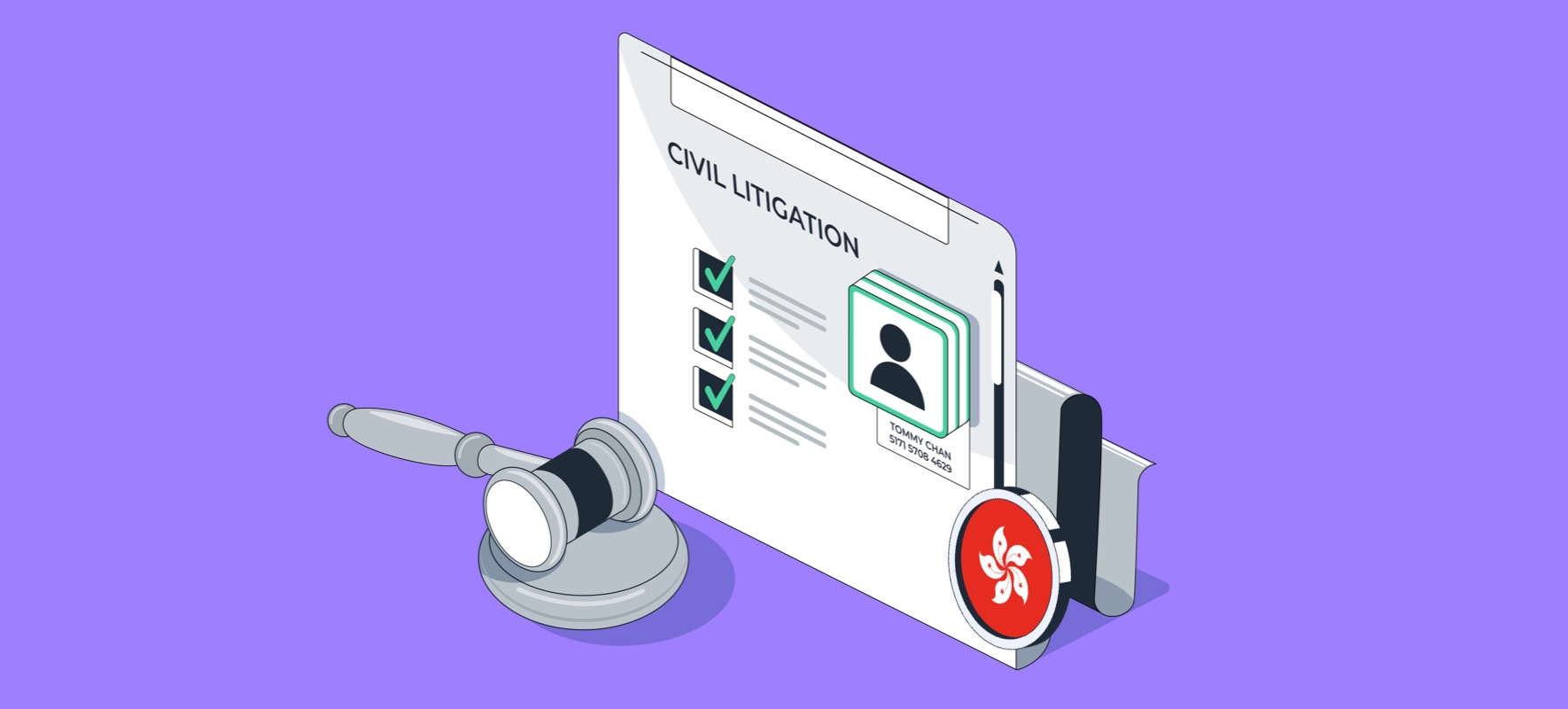When hiring new employees or considering someone for a senior or sensitive position, employers in Hong Kong often focus on criminal record checks, employment history verification, and educational qualifications. However, one area that is sometimes overlooked, yet increasingly important, is the civil litigation checks.
A civil litigation check looks into an individual’s history of involvement in civil lawsuits, such as disputes over contracts, unpaid debts, fraud allegations, intellectual property cases, bankruptcy proceedings, or breach of fiduciary duties. Unlike criminal cases, civil litigation does not necessarily mean the individual has committed a crime, but it can reveal patterns of behaviour that pose significant business risks.
So why should Hong Kong employers pay closer attention to this? Let’s break it down.
Understanding Civil Litigation Checks
A civil litigation check investigates whether a candidate has been involved in non-criminal legal disputes in the past or present. Civil litigation covers a wide range of cases that do not fall under criminal offences but may point to patterns of behaviour that matter in a work setting.
Examples of civil litigation include:
- Breach of contract (e.g., failure to fulfil contractual obligations)
- Debt recovery actions (e.g., defaulting on loans or credit obligations)
- Intellectual property disputes (e.g., copyright infringement)
- Employment-related lawsuits (e.g., wrongful dismissal, discrimination claims)
- Tort claims (e.g., defamation, negligence)
- Breach of fiduciary duty (common for directors and senior executives)
- Bankruptcy proceedings or winding-up petitions
- Shareholder or partnership disputes
A well-conducted check will look for whether the candidate was a plaintiff, defendant, or otherwise named in any of these cases.
How Civil Litigation Checks Differ from Criminal Record Checks?
It’s important to understand the distinction:
Criminal record checks reveal convictions for offences like fraud, theft, assault, corruption, or other crimes prosecuted by the state. While civil litigation checks uncover whether the person has been involved in disputes brought by private parties or companies. Someone can have no criminal record but still have a history of serious civil disputes that could impact your organisation if not discovered.
Why Are Civil Litigation Check Relevant for Employers?
In Hong Kong’s competitive and compliance-heavy business landscape, particularly in industries like finance, insurance, legal, and C-suite recruitment, a candidate’s civil litigation history can reveal red flags that criminal checks alone might miss. Here’s why employers use them:
Identify financial risks: A history of unpaid debts, defaults, or bankruptcy proceedings may raise questions about financial responsibility, crucial when hiring for roles with access to company funds.
Detect potential conflicts of interest: If a candidate has a history of litigation with former employers, partners, or clients, it could signal possible workplace disputes or reputational risks.
Protect company reputation: Senior hires, directors, and key persons are public representatives of your organisation. Allegations of fraud or breach of fiduciary duties can damage stakeholder trust.
Meet regulatory obligations: Certain regulated industries, such as banking and insurance, may expect enhanced due diligence, especially for fit-and-proper tests under the SFC, HKMA, or IA requirements.
What Hong Kong Laws Say About Civil Litigation Checks?
Civil litigation records in Hong Kong are generally public records, court filings, judgments, and orders can be accessed through the Judiciary’s public registers, the High Court and District Court records, and the Hong Kong Government Gazette.
However, you must still comply with the Personal Data (Privacy) Ordinance (PDPO):
Fair and lawful purpose: The check must be relevant to the position and your business interests.
Informed consent: It is best practice, and often required by company policy, to obtain the candidate’s written consent before conducting the check.
Data security: Any information gathered must be stored securely and only used for the stated purpose.
Accuracy: You must ensure that the information is accurate and up-to-date.
Transparency: If an adverse record affects a hiring decision, you should give the candidate an opportunity to explain or clarify.
How Civil Litigation Checks Are Conducted in Hong Kong?
A reputable background screening company will typically follow these steps:
Court Registry Search: They will search the Judiciary’s online database and physical records where needed. This includes:
- High Court (Court of First Instance and Court of Appeal)
- District Court
- Bankruptcy Court
- Small Claims Tribunal (for smaller disputes, if relevant)
Public notices, e.g., disqualification orders published in the Gazette
Identity Matching: One challenge in Hong Kong is name matching, many people may have similar English names. Screening firms cross-check other identifiers such as date of birth, HKID number (where legally permissible), or past employer details to ensure the record belongs to your candidate.
Report Preparation: A clear report summarises any matches, the case type, parties involved, case status (ongoing, settled, dismissed), and the outcome.
Interpretation Support: Not every lawsuit is automatically a problem. Good screening partners help you interpret whether a case is material to the role. For example, a small contractual dispute ten years ago may be less relevant than a recent fraud-related claim.
When Should You Include a Civil Litigation Check?
A civil litigation check isn’t mandatory for every role. It’s best practice for:
- Senior management and C-suite hires.
- Finance, treasury, or accounting roles.
- Roles with authority over contracts and vendor management.
- Positions in regulated industries.
- When the candidate will be a company director or significant shareholder.
What Employers Should Do with the Information?
If a civil litigation check reveals an adverse record, employers should:
- Evaluate the nature of the case (Was it a minor contractual dispute or a serious fraud allegation?)
- Assess the outcome (Was the individual found liable? Was the matter settled?)
- Give the candidate an opportunity to explain.
- Document the decision process for fairness and compliance.
Conclusion
In Hong Kong, the business environment is built on trust, reputation, and accountability. A civil litigation check is not about penalising someone for being involved in a civil dispute, but about gaining a fuller picture to make informed hiring decisions, especially when reputational and financial stakes are high.
Done responsibly, it protects your company, your stakeholders, and your people, ensuring you hire individuals whose past aligns with your values and risk appetite.
Go-To Resource
Don’t Let Hidden Lawsuits Derail Your Hiring.
Get a civil litigation screening strategy tailored for your industry.













